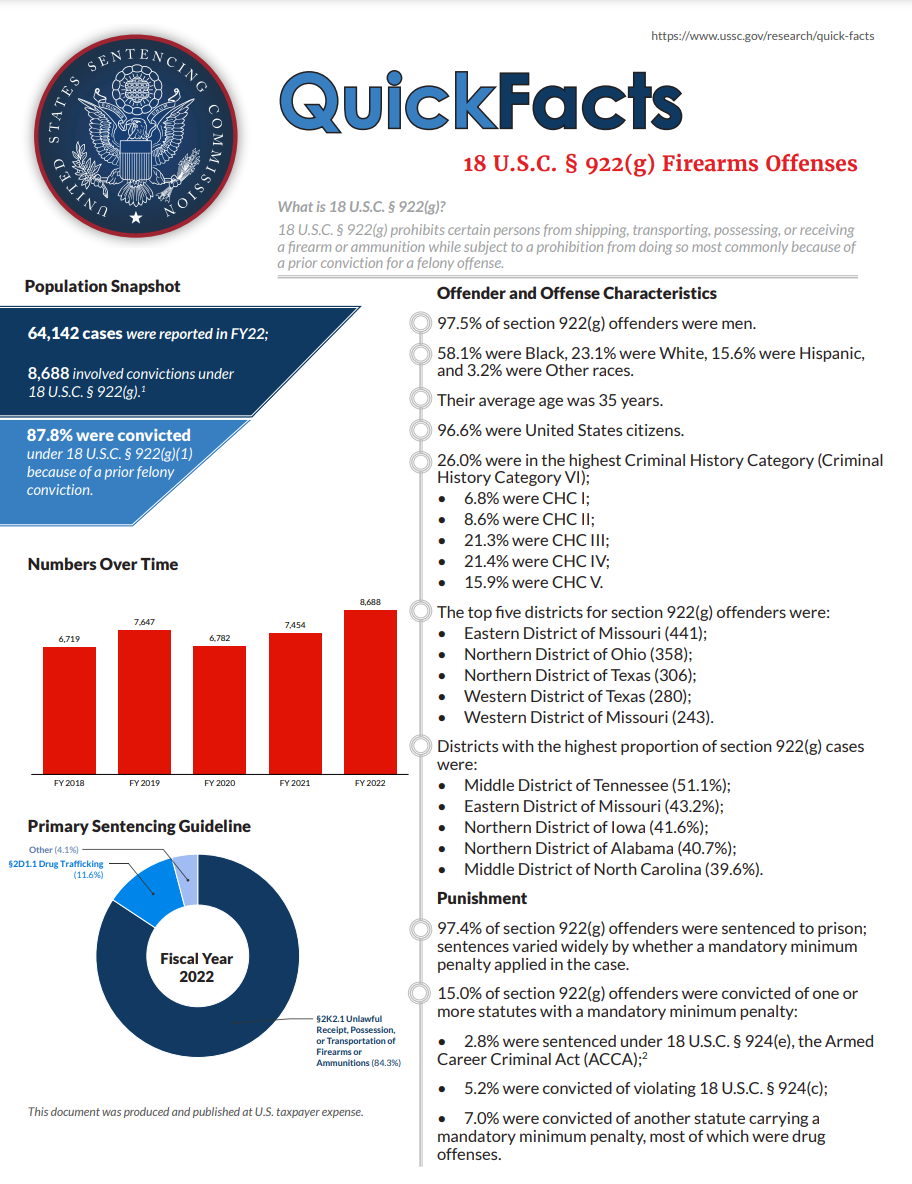Population Snapshot
Of the 61,678 cases reported in FY 2024, 7,419 involved convictions under 18 U.S.C. § 922(g).1 Section 922(g) makes it unlawful for prohibited persons to ship, transport, possess, or receive a firearm or ammunition, most commonly because of a prior conviction for a felony offense. Of the 7,419 individuals, 90.4% were convicted under 18 U.S.C. § 922(g) because of a prior felony conviction.
Click the cover for the PDF handout or learn more below.
Individual and Offense Characteristics
- 98.0% of section 922(g) individuals were men.
- 58.1% were Black, 20.8% were White, 17.1% were Hispanic, and 4.0% were Other races.
- Their average age was 36 years.
- 95.4% were United States citizens.
- 23.6% were in the highest Criminal History Category (Criminal History Category VI);
- 8.6% were CHC I;
- 13.2% were CHC II;
- 23.8% were CHC III;
- 16.1% were CHC IV;
- 14.7% were CHC V.
- The top five districts for section 922(g) individuals were:
- Eastern District of Missouri (421);
- Western District of Texas (218);
- Western District of Missouri (198);
- Northern District of Ohio (196);
- Eastern District of Arkansas (188).
- Districts with the highest proportion of section 922(g) cases were:
- Eastern District of Missouri (42.2%);
- Eastern District of Arkansas (37.7%);
- Middle District of North Carolina (37.3%);
- Middle District of Tennessee (36.3%);
- Northern District of Iowa (34.9%).
Punishment
- 97.7% of section 922(g) individuals were sentenced to prison; sentences varied widely by whether a mandatory minimum penalty applied in the case.
- 16.5% of section 922(g) individuals were convicted of one or more statutes with a mandatory minimum penalty:
- 2.6% were sentenced under 18 U.S.C. § 924(e), the Armed Career Criminal Act (ACCA);2
- 5.9% were convicted of violating 18 U.S.C. § 924(c);
- 8.0% were convicted of another statute carrying a mandatory minimum penalty, most of which were drug offenses.
- The average sentence for all section 922(g) individuals was 71 months.
- The average sentence for individuals convicted of violating section 922(g) and sentenced under ACCA was 199 months.
- The average sentence for individuals convicted of violating section 922(g) but not sentenced under ACCA was 67 months.
Sentences Relative to the Guideline Range
- 61.2% of sentences for convictions under section 922(g) were under the Guidelines Manual.
- 51.4% were within the guideline range.
- 5.9% were substantial assistance departures.
- The average sentence reduction was 45.9%.
- 0.1% were Early Disposition Program (EDP) departures.3
- The average sentence reduction was 25.8%.
- 3.1% were some other downward departure.
- The average sentence reduction was 36.2%.
- 0.7% were upward departures.
- The average sentence increase was 40.3%.
- 51.4% were within the guideline range.
- 38.8% of sentences for convictions under section 922(g) were variances.
- 33.6% were downward variances.
- The average sentence reduction was 34.7%.
- 5.2% were upward variances.
- The average sentence increase was 45.2%.
- 33.6% were downward variances.
- The average guideline minimum and average sentence imposed have fluctuated over the past five years.
- The average guideline minimum was 70 months in fiscal year 2020 and 80 months in fiscal year 2024.
- The average sentence imposed was 62 months in fiscal year 2020 and 71 months in fiscal year 2024.
1 Cases with incomplete sentencing information were excluded from the analysis.
2 18 U.S.C. § 924(e) requires a 15-year mandatory minimum penalty be imposed on individuals convicted of violating section 922(g) with three previous convictions for a violent felony or serious drug crime.
3 "Early Disposition Program" (or EDP) departures are departures where the government sought a sentence below the guideline range because the defendant participated in the government’s Early Disposition Program, through which cases are resolved in an expedited manner. See USSG §5K3.1.
SOURCE: United States Sentencing Commission, FY 2020 through FY 2024 Datafiles, USSCFY20-USSCFY24.

